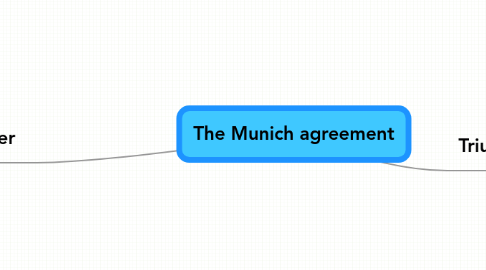
1. Disaster
1.1. Dubious morality
1.1.1. 100,000's of czechs forcibly moved from Sudetenland
1.1.2. breaking up democratic country against their will
1.1.2.1. intimidation and force works
1.1.2.2. czechs dont' have part in the munich discussions
1.1.2.3. GB and F won't support czechs unless they agree to the agreement
1.2. Destroyed czechoslovakia as a sustainable country
1.2.1. lost 70% of key industry
1.2.2. lost key defences against attack
1.2.3. encouraged other ethnic minorities to demand independance
1.2.3.1. slovaks, poles and hungarians
1.2.3.1.1. Hitler deliberately tells them to want independance to cause trouble and give Nazi's excuse to invade
1.2.4. condemned czechosolvakia
1.3. impact on hitler
1.3.1. in a weak position prior to munich
1.3.1.1. reaction of berliners to military march
1.3.1.1.1. 27th September
1.3.1.1.2. public display of apathy
1.3.1.2. Army Leadership against war
1.3.1.2.1. leading Nazi's against war
1.3.1.3. firmly united stance after Godesburg from GB, F and SU
1.3.1.3.1. start to mobilise
1.3.2. Munich let him off the hook
1.3.2.1. Godesburg by a different name
1.3.2.1.1. increases popularity
1.3.2.1.2. army and moderate Nazi's unlikely to act
1.4. better to fight in 1938
1.4.1. Germany not that strong
1.4.1.1. 17% GNP
1.4.1.2. Luftwaffe not strong enough to launch attack on GB
1.4.1.3. Had lack of tanks, fuelm amunition and trained reserved
1.4.2. French had strongest army
1.4.2.1. Hitler's confidence increases that GB and France will not stand up to him
1.4.2.1.1. worms
1.4.3. Czech, SU, F and GB army stronger than Germany's
1.4.3.1. call Hitler's bluff
1.4.4. war on 3 fronts
1.4.4.1. czechoslovakia strong army
1.4.4.1.1. resist Nazi's?
1.4.5. Hitler's popularity would have decreased
1.5. Impact on Stalin
1.5.1. Felt GB and France were pushing Hitler East
1.5.2. Don't trust Communism
1.5.3. Soviet Union not invited to Munich
1.6. Unrealistic views of Hitler's intentions
1.6.1. Chamberlain felt that aims were limited
1.6.2. 'piece of paper' not significant
1.6.3. 'Peace for our time' not true
1.6.4. Generally believes he has secured peace
2. Triumph
2.1. avoided war in 1938
2.1.1. gave Hitler an opportunity to show his aims had limits
2.2. initial public support
2.2.1. right wing press
2.2.2. opinion poll. 51% thought satisfactory
2.2.3. reaction to Chamberlain's departure/return
2.2.3.1. Buckingham
2.2.3.2. Downing Street
2.3. settled legitimate German grievance
2.3.1. moral commitment to self-determination
2.3.1.1. 3.5 million germans in sudetenland
2.3.1.2. reversing treaty of versailles
2.4. gave britain time to prepare for war
2.4.1. increase in military spending over 12 months
2.4.1.1. 21% GNP in 1939
2.4.1.2. 8% GNP in 1938
2.4.2. BEF massively increased
2.4.3. developed radar defences
2.4.4. increased production of fighter planes
2.4.4.1. hurricanes
2.4.4.2. spitfires
2.5. Gives France time to prepare for war
2.5.1. most prepared army for war in 1938
2.6. difficulty of helping czechoslovakia
2.6.1. geographical position
2.6.1.1. France have to go through Germany
2.6.1.2. Soviet Union through Poland
2.6.2. German military believed 10-11 days to beat czechs.
